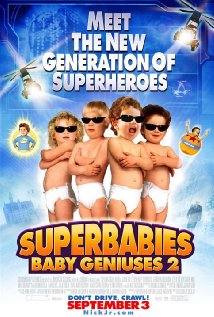Intelligence Designed
Whether it’s a leg-up in the family business, enrollment in the best schools, or access to professional athletic training, parents have always scrambled to secure the maximum advantage for their children. Science has provided more sophisticated, if less ethical, opportunities: Parent-enabled abuse of steroids and human growth hormone attempt to boost athletic performance…and scholarship prospects. Genetic enhancement is the next step, and it would be naive to think it won’t happen once the technology and ambition meet. We’re already at the threshold of theraputic prenatal gene therapy for birth defects. Genetic tweaking for improved intelligence or any number of other characteristics isn’t far behind.
If you had the chance to maximize your baby’s brainpower, would you? How about if that opportunity was freely available to everyone?
Take a couple of minutes and think about the implications of that decision.
In an online article for Discover magazine, Kyle Munkittrick uses Orson Scott Card’s Ender novels to launch a discussion about artificially-enhanced intelligence. Mr. Munkittrick argues that intellectual enhancement via genetic engineering and/or cybernetics is not a zero-sum game or unfair competitive advantage because it has the potential to benefit everyone–and it’s hard to see an obvious downside in boosting mankind’s average IQ.
Of course, as with any new technology, there may be unintended consequences. Here’s another perspective on a future of genetically-enhanced children, from Greg Bear’s short story, “Sisters.”
Some PPCs had been designed by their parents to qualify physically and mentally for space careers. Some had been equipped with bichemistries, one of which became active in Earth’s gravity, the other in space. How could an NG compete with that?
Of the seven hundred adolescents in her high school training programs, Letitia Blakely was one of ten NGs–possessors of natural, unaltered genomes. Everyone else was the proud bearer of juggled genes, PPCs or Pre-Planned Children, all lovely and stable with just the proper amount of adipose tissue and just the proper infusion of parental characteristics and chosen features to be beautiful and different; tall, healthy, hair manageable, skin unblemished, well-adjusted (except for the occasional blitzer) with warm and sunny personalities. The old derogatory slang for PPCs was RC–Recombined.
Letitia, slightly overweight, skin pasty, hair frizzy, bulbous-nosed and weak-chinned, one breast larger than the other and already showing a droop pronounced enough to grip a stylus–with painful menstrual periods and an absolute indisposition to athletics–was the Sport. That’s what they were called. NG Sports. TBs–Throwbacks. Neanderthals.
Before long, we discover the ability to create designer children may result in more than new prejudices, but I won’t spoil that for you.
As Christian speculative fiction writers and readers, I think it’s part of our charter to explore the moral and spiritual impacts of these sorts of changes…before they happen. At what point do we cross the line into playing God? What happens when intelligence is valued over wisdom? How might altering the intellectual balance of our society change how we treat each other, for better or worse? Is there such a thing as a Christian approach to genetic engineering, and if so, what would it look like? Is a genetically-engineered person more or less than a human being? How would a future Church minister to genetically-enhanced people, or non-enhanced people in a world where most have been modified in some fashion?
Lots of story ideas here, but you’d better hurry…the science fiction is about to become reality.











































Great subject Fred, and one that science fiction definitely needs to cover. I like the description of Letitia, and will have to give that story a go soon. As for what the implications are, I think Ender’s Game is actually a very good way to frame the conversation, since the three Wiggins children show very different reactions to the genetic manipulations they experienced. It’s not a spoiler to say that at the start of their childhood one is a sadistic bullly, one an empathetic nurturer, and one a needy kid. There are specific reasons for the genetic work used to create them.
But Card doesn’t leave them in the same place he found them. They grow and change signficiantly over the course of the novel. For my money, Valentine the nurturer shows the most variation and development as a character. However, I think Ender’s plight is the one that really raises the question: if you were “created” for one single human contrived purpose, what would that be like? And (spoiler, I suppose): what happens when that purpose is fulfilled? As Christians, we believe we are equipped by God to fulfill His divinely ordained plan for our lives. But we also believe that our number one purpose is to love and and worship Him, to experience His love for us in a personal relationship brought about by redemption through Christ. So even if we do not measure up to a cosmic measure of achievement, we may still fulfill that mandate. In Ender’s case, love appears denied him due to the nature of his mission. Unlike with God, he has little to no choices in the fulfillment of his purpose. While seemingly the most powerful figure in the battle, he is also the one with the least liberty. It strikes me as I type that this may wind it’s way to a Free Will discussion if I continue, so I’ll move on for the time being. 😉
This subject is also very strongly presented in the movie Gattaca, a very underappreciated science fiction gem. The main character shares the same problem as Letitia in being one of the few naturally born children left (or a “God child,” as he’s called by one character). It’s not really a spoiler to reveal that the way he gets around the system is to “buy” the genetic identity of another person. That character (played by Jude Law in an excellent performance) is the real surprise of the movie, since even with his supposed preplanned perfection he is unable to do what he most wants and despairs at not living up to his potential. Both characters go through a journey not just to the stars but to understanding who they are, and how that transcends their genes. To piggy back on what I just wrote on Becky’s post from yesterday, sacrifice and the love it demonstrates our qualities that demand our attention. And for all that science may one day offer, I do not believe we will ever discover how to “force” love (and I do mean True Love). Hmm, that last bit sounds like that new book Forbidden by Dekker and Lee.
One final thought in this already too long comment: I believe the Firebird trilogy specifically addresses how the people of God might handle genetic manipulation, since it is a reality for the Sentinels. Their teleapthic natures seem at once a blessing and a curse, which is really how most advancements tend to be throughout human history. As Solomon wrote, there’s really nothing new under the sun. The human condition doesn’t change that much.
Oh, please. Like such a “beneficial” treatment would ever be available to everyone. It would be controlled and abused by governments, like certain governments force abortions and steal aid supplies.
And why do folks assume that such gene manipulation would have no side effects? And that we understand exactly what we’re dealing with in genetics?
Is a universally high IQ necessarily a good thing? Folks with autism and other conditions are intelligent but have difficulty expressing themselves to everyone else.
And if everyone were intellectual, who would perform the societal tasks that intellectual types find tedious? Computers don’t feed us.
Manupulation of genes always creepies me out. For that matter, anything that’s supposed to be an ‘improvement’ does. For example, the unbodied space people in 2001: A Space Odyssey and the sequels– if they can SPOILER:blow up Jupiter to make a sun SPOILER, why should we trust them?
I’ve seen Gattaca and read Ender’s Game as well…genetic engineering makes me so nervious. And cloning even more–the recent Doctor Who episodes ‘The Rebel Flesh’ and ”The Almost People” really brings up some issues that the film Avatar glossed over.
Yeah, DW has played with it a couple times. My only thing with cloning is I really do think that the clone would have a distinct soul that separated the clone from the original. Haven’t researched it much…but I wrote a short story once on the subject; it was fun.
Genetic engineering really should make people nervous.
Yes, I would think so. After all, identical twins are (natural) clones, and they have their own souls.
Good article, Fred. Interesting that true science fiction is not a particularly hot item right now, what with all the changes taking place in real science.
Austin Boyd did a bit of what you’re suggesting in his Mars Hills Classified series. It started out dealing with space travel at first, but ended up addressing cloning.
So will cloning win out over genetic enhancement?
But I think you’ve given humans too much credit. I doubt if enhance IQs will be the big push. It will be physical enhancements primarily — beauty, strength, height. Let’s have a race of super jokes! Or movie stars! That’s what the culture cares about most, isn’t it? 😉
Becky
Becky: I’d expect that people will want the whole package: beauty, brains, strength…all those measures we use when comparing our children to everyone else’s. Enhanced intelligence might be an easier sell politically, because as Mr. Munkittrick noted in his article, it’s not just a superficial improvement with individual benefit. More and better problem-solving ability, in theory, makes everybody’s life better. In practice…well, that remains to be seen, which is where I think spec-fic can help us visualize what that sort of future could look like.
With regard to cloning, I think that creating not merely a copy of oneself, but an offspring that represents that self perfected is the greater temptation.
The Greg Bear story I linked illustrates the pressure on parents to go with the flow on something like this, rather than allow their children to be less-competitive than their peers in school and work, less-attractive to the opposite sex, subject to ridicule, or simply different, and I don’t think Christian parents are immune.
Very interesting post.
And what would the Christian response be to genes that predisposed people to sin—the addictive personality gene, say.
I don’t believe there is a “gay gene” but Mohler speculated on it years ago.